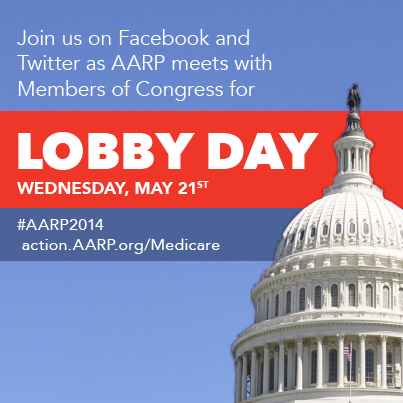AARP Hearing Center

AARP Hawaii State President Gerry Silva and State Director Barbara Kim Stanton visited Capitol Hill on May 21 to urge Hawaii’s elected representatives to back bills, including the Older Americans Act, that can help Americans live their best lives. Visits to the offices of Senators Mazie Hirono and Brian Schatz and Members of the U.S. House of Representatives Colleen Hanabusa and Tulsi Gabbard took place to discuss a variety of issues crucial to older Americans.
“This Congress has an opportunity to pass bipartisan legislation that benefits older Americans from Hawaii including the reauthorization of the Older Americans Act, the landmark 1965 law that helps provide essential services to millions of our most vulnerable seniors,” said State Director Stanton. “During the month that celebrates and recognizes older Americans, we urge Congress to take action on a long list of issues that matter to our AARP Hawaii members and their families.”
The issues that AARP raised with members of the House and Senate from every state include:
- The Older Americans Act (S.1562 / H.R.3850): The reauthorization of the bipartisan Older Americans Act provides an array of programs and services to assist, protect, nourish and sustain Hawaii’s seniors with maximum dignity and independence. In Hawaii, $6.1 million in Title III funding for vulnerable seniors in 2014 goes to meal and nutrition services, caregiver support, and preventive health care, among other things. AARP has consistently supported and urged a reauthorization with minor changes to strengthen and improve this crucial law.
- Medicare Sustainable Growth Rate (SGR): Also known as the “Doc Fix,” Medicare beneficiaries and doctors shouldn’t have to deal with the uncertainty of short term solution after short term solution. Doctors and their patients deserve a stable, predictable reimbursement system that will encourage doctors and providers to deliver high-quality care. AARP supports a permanent repeal of SGR and a move toward a reimbursement system that promotes quality and value without shifting costs onto beneficiaries through higher cost-sharing or reduced benefits.
- Responsible Solutions for Medicare’s Adequacy and Solvency: AARP believes we can improve Medicare solvency by generating savings throughout the entire healthcare system, such as finding ways to reduce waste, fraud, and abuse; improving care coordination; and lowering prescription costs. This must also be achieved without shifting costs onto beneficiaries through higher cost-sharing or reduced benefits.
- The Protecting Older Workers Against Discrimination Act (POWADA) (S.1391 / H.R.2852): The passage of the bipartisan POWADA would protect workers by reestablishing the principle that unlawful discrimination should not play a role in workplace decisions. A recent Supreme Court decision made it more difficult for older workers to prove claims of illegal bias based on age.
- The Safe Streets Act (S.2004 / H.R.2468): The passage of the bipartisan Safe Streets Act would ensure that planners and traffic engineers design, construct, and operate roads with the safety of all users in mind by directing states and metropolitan planning organizations (MPOs) to create a "safe streets" policy within two years of enactment. The policy would be different for each locality based on their individual communities.
As Congress gets closer to a midterm election expected to once again see the influence of older voters, AARP’s volunteers hope that their issues resonate clearly before they head to the voting booths in November.































































